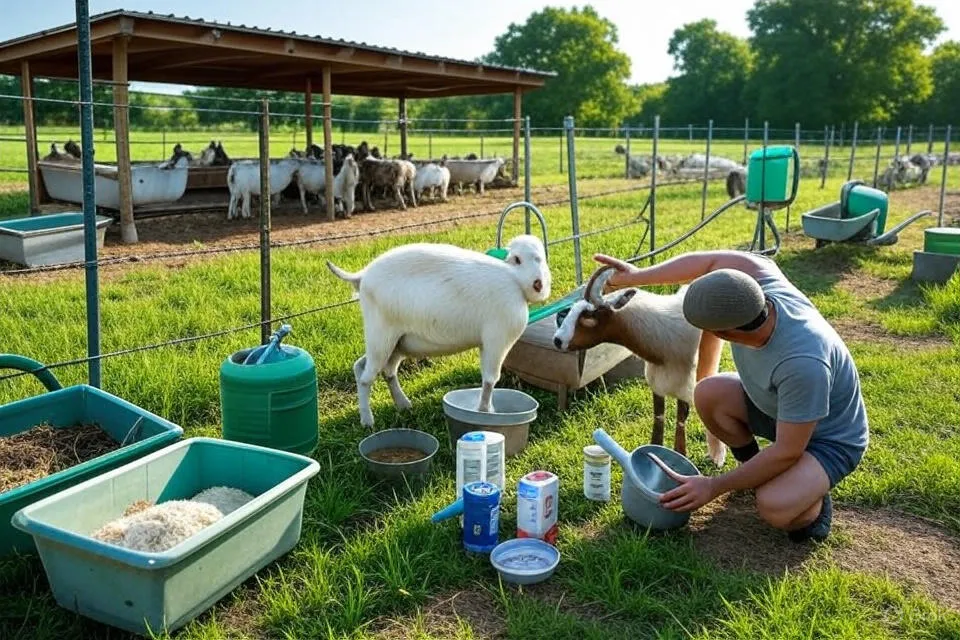Starting a goat farm is an exciting venture, whether you’re raising goats for milk, meat, or as charming backyard companions. But success hinges on having the right equipment to keep your goats healthy and your operation smooth. This guide explores must-have goat farming equipment for beginners, focusing on practical tools and products to set you up for success. From shelters to feeding systems, we’ve got you covered with actionable tips to make your goat journey rewarding.
Why Invest in Quality Goat Farming Equipment?
High-quality equipment saves time, reduces stress for your goats, and boosts productivity. For beginners, choosing the right tools can make the difference between a thriving herd and costly mistakes. Equipment tailored to goat care—think sturdy fencing or reliable milking systems—ensures your animals stay safe and healthy, which is key for both hobbyists and commercial farmers. Plus, investing in durable products now can save money long-term by minimizing replacements.
Must-Have Goat Farming Equipment
1. Secure Fencing
Goats are notorious escape artists. A sturdy fence is your first line of defense. Opt for woven wire or high-tensile electric fencing, at least 4–5 feet tall, to keep goats contained and predators out. For small herds, consider portable electric netting for flexibility.
Pro Tip: Check fences weekly for weak spots to prevent escapes. A single breakout can lead to lost goats or costly damage.
2. Shelter and Housing
Goats need protection from rain, wind, and extreme temperatures. A simple three-sided shelter works for small herds, but ensure it’s well-ventilated and draft-free. For milking goats like Nubians or Alpines, a barn with separate stalls simplifies management.
Cost-Saving Tip: Repurpose existing structures like sheds, but ensure they’re goat-proofed with no sharp edges or toxic materials.
3. Feeding and Watering Systems
Goats require constant access to clean water and nutritious feed. Invest in:
- Hay Feeders: Wall-mounted or free-standing feeders reduce waste by keeping hay off the ground. Look for designs with slats to prevent goats from climbing in.
- Water Buckets: Heavy-duty, tip-resistant buckets or automatic waterers ensure a steady supply. Clean them daily to avoid contamination.
- Grain Feeders: Use troughs for grain or supplements, sized for your herd to avoid competition.
Why It Matters: Proper feeding equipment supports goat health, especially for breeds like Nigerian Dwarfs, which need balanced nutrition for milk production.
4. Milking Equipment (For Dairy Goats)
If you’re raising dairy breeds like Saanens or LaManchas, a milking setup is essential. Start with a basic hand-milking kit, including a stainless steel pail and teat dip for hygiene. For larger herds, consider a portable milking machine to save time.
Beginner Tip: Sanitize all equipment after each use to prevent mastitis and ensure milk quality.
5. Grooming and Health Care Products
Regular grooming and health checks keep goats thriving. Essential goat care products include:
- Hoof Trimmers: Sharp, curved trimmers for monthly hoof maintenance to prevent lameness.
- De-wormers and Vaccines: Consult a vet for a de-worming schedule and vaccines like CDT (Clostridium perfringens and tetanus).
- First-Aid Kit: Stock bandages, antiseptic sprays, and thermometer for emergencies.
Expert Advice: Learn basic goat health checks to catch issues early, saving on vet bills.
6. Handling Equipment
Goats can be stubborn, so handling tools make tasks like moving or medicating easier:
- Collars or Halters: Durable nylon collars for leading goats.
- Headgates or Stanchions: Useful for milking, hoof trimming, or vet checks.
Safety Note: Train goats to accept handling equipment gradually to reduce stress.
Choosing the Right Goat Care Products
When selecting equipment, prioritize durability and goat-specific designs. Cheap tools often break under goats’ curious nibbling or climbing habits. Look for reputable brands like Premier1Supplies or Tractor Supply for fencing and feeders. For health products, consult your vet or local farm co-op to ensure quality. Always read reviews and compare prices to balance cost and reliability.
Budgeting for Beginner Goat Farming
Starting small? A basic setup for 2–5 goats can cost $500–$1,500, depending on your region and equipment choices. Here’s a rough breakdown:
- Fencing: $200–$500
- Shelter: $100–$400
- Feeders and Waterers: $50–$150
- Milking/Health Supplies: $100–$300
Money-Saving Hack: Join local farming groups or check sites like Craigslist for used equipment in good condition.
Where to Buy Goat Farming Equipment
Shop at trusted retailers like:
- Premier1Supplies: Known for fencing and handling gear.
- Tractor Supply Co.: Offers feeders, waterers, and health products.
- Amazon: Great for milking kits and grooming tools, but verify seller ratings.
Local Tip: Visit nearby feed stores or co-ops for deals and advice from experienced farmers.
Final Thoughts on Goat Farming Success
Starting a goat farm is a journey of learning and growth. By investing in quality goat farming equipment, you set a strong foundation for healthy, happy goats. From secure fencing to reliable feeders, each tool plays a role in your success. Ready to dive in? Explore our full range of goat care guides and product reviews to take your farm to the next level!
Sources:
- University of Maryland Extension: Goat Housing and Equipment
- American Dairy Goat Association: Beginner’s Guide to Goat Care
